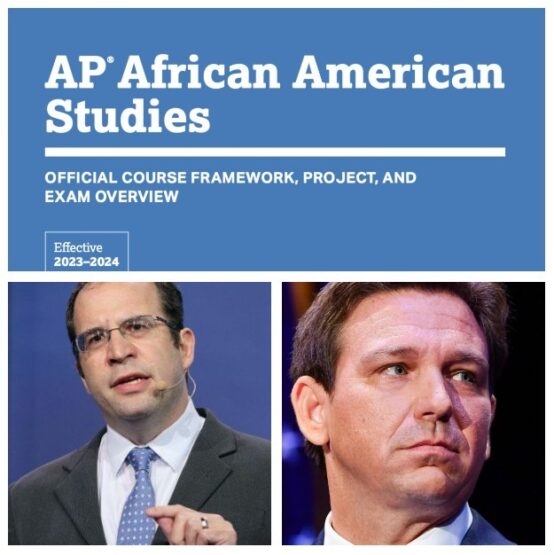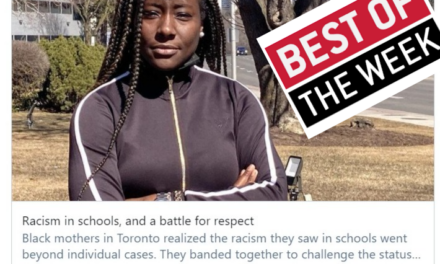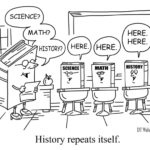In revising its framework, the College Board was just doing what it’s often done. But with the media’s help, DeSantis somehow convinced the public he was responsible.
By Adam Laats
If you only read the headlines, you might think that Florida’s Governor Ron DeSantis just won a game of culture-war chicken against the College Board.
You might believe that he forced the College Board to water down its framework for Advanced Placement African American Studies (APAAS), moving controversial topics and key thinkers into an optional side section and adding content about Black conservatism.
But that’s not what happened.
It takes only a passing familiarity with the recent history of school culture wars to see the truth: With or without DeSantis’s grandstanding, the College Board was going to move its framework for APAAS to the middle of the road.
The real win for DeSantis was not in successfully changing the content of the new AP course but in making journalists and voters think he was responsible.
Framing this story as a showdown between DeSantis and the College Board serves only to improve DeSantis’s chances at the Oval Office in 2024 and to let him employ a favorite strategy: gaming the media to focus attention where he wants it (and to avoid attention to other issues).
The real win for DeSantis was not in successfully changing the content of the new AP course but in making journalists and voters think he was responsible.
Like a lot of people, I am familiar with the ways AP classes are developed.
I was a high-school teacher for a long time, and now I work with a lot of high-school teachers.
And, like a lot of teachers, I have a mixed opinion of AP classes and the work of the College Board.
I have no inside knowledge of how the changes were made to the APAAS framework.
But one thing is clear: It is a big mistake to think that the College Board is any sort of bold activist organization, to assume that it might ever be willing to face down conservative pressure.
That is not how the organization works.
Rather, the College Board takes elaborate pains to avoid controversy in their frameworks, or even the merest appearance of controversy.
Follow @thegrade_ for education news, events, and newsroom changes. Follow @alexanderrusso for thought-provoking commentary all day, every day.
The College Board takes elaborate pains to avoid controversy in their frameworks, or even the merest appearance of controversy.
In the case of this course’s framework, even a casual observer knew that the first draft would lose much of its material.
In 2014, the College Board issued a new framework to help students prepare for its exam in AP United States History (APUSH).
Many of the ideas were inarguably central to a good understanding of US History. They included non-controversial ideas among historians, such as the fact that the nation’s Founding Fathers believed in “white superiority.”
The new framework—again, absolutely in line with mainstream historical thinking—noted that many white Southerners felt “pride in the institution of slavery.”
Such ideas are beyond challenge as statements of historical fact, but they were not at all beyond challenge as political targets.
Conservative attacks on the 2014 framework were as vicious as they were predictable. In Oklahoma, Texas, Georgia, Nebraska, North Carolina, and Tennessee, state legislatures considered proposals to cut funding for schools that taught the new APUSH.
The Republican National Committee adopted a resolution against the framework. They decried the lack of emphasis on the Founding Fathers and the lack of focus on the religious nature of the nation’s founding.
The College Board did not stand up in the face of such accusations and defend its work as the best current historical knowledge. The organization did not insist on its central ideas; it did not point out the obvious truth that any fair-minded course on American history must confront difficult truths about racism and genocide.
The College Board did not stand up in the face of such accusations and defend its work as the best current historical knowledge.
Instead, the College Board changed the framework.
For example, instead of saying—as the 2014 framework did—that European settlers “helped increase the intensity and destructiveness of American Indian warfare,” the new framework said only that European tactics “stimulated changes” in indigenous cultures.
Instead of focusing on challenging questions about Japanese internment and the use of atomic weapons, the revised framework emphasized America’s involvement in World War II as a fight for freedom.
The changes in the more recent African American Studies framework followed the same path.
Content was downplayed in spite of its obvious vital importance because the content could be seen as provocative to some.
It wasn’t heroic, but it also wasn’t out of the ordinary — or done to appease DeSantis in particular.
It wasn’t heroic, but it also wasn’t out of the ordinary — or done to appease DeSantis in particular.
Some of today’s observers might not remember the AP US History changes of 2015, but the leaders of the College Board certainly do.
They undoubtedly knew in advance that some of the content of their new African-American Studies framework would provoke controversy. And they doubtless planned in advance to change it, specifically to edit out the most provocative parts.
As Jamelle Bouie recently wrote, DeSantis uses these kinds of grand-but-empty culture-war gestures to avoid talking about real issues.
DeSantis much prefers attacking the College Board instead of addressing Florida’s much bigger educational problems.
Right now, there are 100,000 students in Florida who lack a full-time teacher because of the state’s dire teacher shortage.
DeSantis could fix this problem, perhaps by improving teacher pay—among the lowest in the nation.
Instead, DeSantis was able to get enormous national attention for taking a meaningless stand against an already-changed framework. He improved his standing with MAGA voters by claiming credit for an outcome that was obvious in advance.
A former middle and high school teacher, Adam Laats is a historian who writes about schools, religion, and conservatism. Follow him at @AdamLaats.
Previously from The Grade
No ‘red wave’ for education, either
The Great Math Textbook Hoax of 2022
How to cover school culture war stories
For education journalists, the culture war is the easy, less important story
ABOUT THE AUTHOR

The Grade
Launched in 2015, The Grade is a journalist-run effort to encourage high-quality coverage of K-12 education issues.















